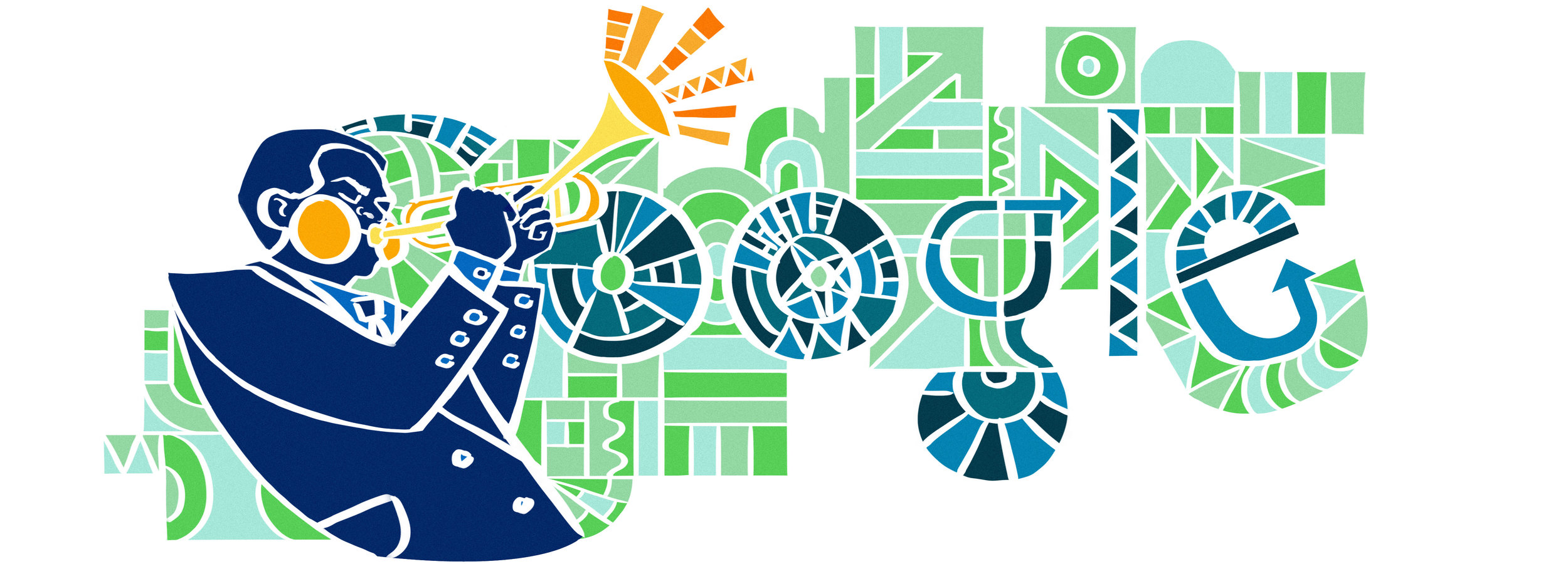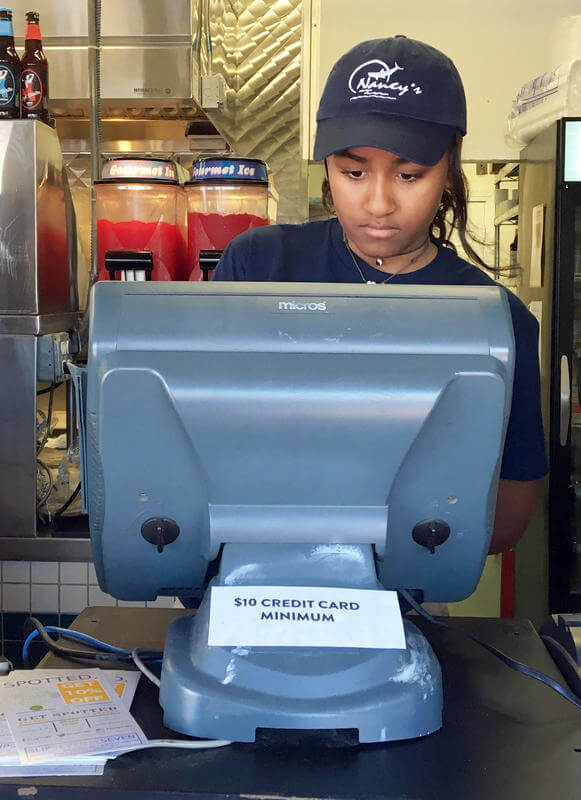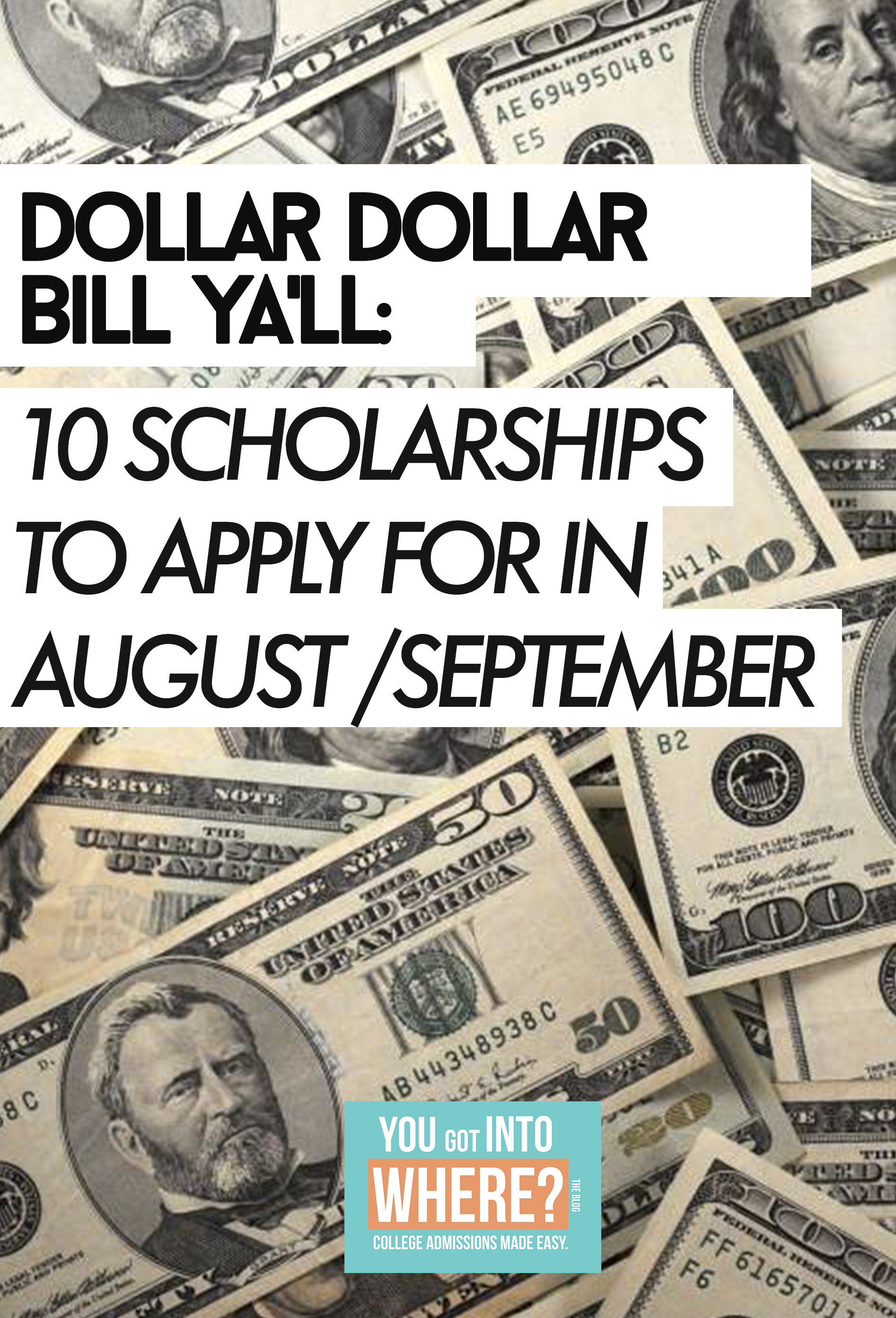How to Decide if You Should Intern or Work This Summer
/Now that the school year is coming to a close, students across the country are deciding if an internship or job is the best option for them this summer.
Read MoreYou Got Into Where? is a college admissions advice blog for high school students created by Joi Wade. Topics include the college search, SAT and ACT, college essays, the common application and college scholarships.
Now that the school year is coming to a close, students across the country are deciding if an internship or job is the best option for them this summer.
Read More
Shortly after I started senior year of high school, I attended a FAFSA informational meeting. I walked in into the meeting room to hordes of parents and their uninterested children crowded around the front of the room near the speaker. Throughout the meeting, parents raised their hands and took pages of notes but at the end, the most common asked question from the parents was whether their child would qualify when they are more than well-off (combined your parents make over 150-200K). Parents at the end of the session waited in line to speak with the presenter to tell them of their situation, among them were my parents. They asked whether they should even attempt to fill out the application among other things. However, the one answer that the presenter told everyone was that the parents should definitely file out the FAFSA.
FAFSA, or Free Application for Federal Student Aid, is a FREE form that the federal government, states, and colleges/universities use to award grants, scholarships, work study and student loans
meeting. I walked in into the meeting room to hordes of parents and their uninterested children crowded around the front of the room near the speaker. Throughout the meeting, parents raised their hands and took pages of notes but at the end, the most common asked question from the parents was whether their child would qualify when they are more than well-off (combined your parents make over 150-200K). Parents at the end of the session waited in line to speak with the presenter to tell them of their situation, among them were my parents. They asked whether they should even attempt to fill out the application among other things. However, the one answer that the presenter told everyone was that the parents should definitely file out the FAFSA.
FAFSA, or Free Application for Federal Student Aid, is a FREE form that the federal government, states, and colleges/universities use to award grants, scholarships, work study and student loans . The maximum amount college students received from the 2014-15 financial aid award year was $5,730. The grants and scholarships
. The maximum amount college students received from the 2014-15 financial aid award year was $5,730. The grants and scholarships are free but any loans have to paid back. This year, the FAFSA has received a few changes. The form is available in October instead of January and parents are allowed to use the prior-prior year tax information instead of the prior tax year. This gives students more time to apply for aid as well as allow for parents to file for FAFSA before filling their previous year’s taxes.
are free but any loans have to paid back. This year, the FAFSA has received a few changes. The form is available in October instead of January and parents are allowed to use the prior-prior year tax information instead of the prior tax year. This gives students more time to apply for aid as well as allow for parents to file for FAFSA before filling their previous year’s taxes.
Filing for financial aid is a good idea just in case your family experiences a change in financial circumstance such as a job loss. Some schools may not be able to reconsider applications for assistance after their deadlines, even if a family’s financial status changes. Do notify them however as soon as possible. It will make the process easier. Having a FAFSA form filled out allows for you to get the option to request reconsideration due to the fact your status changed. Some colleges do have contingency funds for such situations. Money is limited but schools might give priority to the students who have their FAFSA on file.
allows for you to get the option to request reconsideration due to the fact your status changed. Some colleges do have contingency funds for such situations. Money is limited but schools might give priority to the students who have their FAFSA on file.
Financial aid is calculated based on the difference between the cost of attendance and the expected family contribution, or EFC, which is calculated on the FAFSA. So if you have siblings, especially if they are in your age group, you are in luck! Students from well-off families could qualify for aid at expensive colleges, especially if multiple children from the family are in college at the same time.
The government requires students to complete a FAFSA if they want to be eligible for any federal student loans or grants. When you fill out the FAFSA, they send you a letter with information regarding your applications as well as any grants and loans you would could earn. There are non-need-based loans that students from wealthy families can qualify for. If you want to consider borrowing money for your student, you will need to complete a FAFSA to access government college loans. Some colleges may also require a FAFSA in order to be considered for certain non-need-based scholarships.
you would could earn. There are non-need-based loans that students from wealthy families can qualify for. If you want to consider borrowing money for your student, you will need to complete a FAFSA to access government college loans. Some colleges may also require a FAFSA in order to be considered for certain non-need-based scholarships.
Now, if you do not get money the first time, you can apply for FAFSA every year so if your EFC changes as mentioned above changes, it adjusts to your needs. However, make sure you keep up with your grades to earn the maximum amount of money.
I hope these tips will help you out this upcoming year. Leave a comment down below if you have any questions. And as always make sure you follow us on Instagram and Facebook.

Scholarships you need to look into starting in October
Are you a currently enrolled in an accredited college or university? Are you physically residing in the United States? Are you registered or have an account with Course Hero? Then this scholarship is for you. In four simple steps you can will a scholarship towards your education. All you have to do is make an account with Course Hero, give advice on classes you’ve taken, submit five original documents, and share on social media. That simple!
Do you plan to attend college but finances are a problem? No worries, apply to the College JumpStart Scholarship. The only requirements is to be current sophomore, junior, senior, college student, or non-traditional student and are/plan to attend a post-secondary institution. Answer one of the four personal statements on the application, which is being judged based on content not writing skills. Run over to the website and apply; it should take only 20 minutes.
Roses are red, violets are blue, you’re reading this article, and I thank you. Well, I’m pretty sure you can come up with a better poem than that. This scholarship is for those who are into creative writing (more specifically those who like poetry). Write a poem about what makes you feel good. All you have to do is go to the website and add your poem.

Do you want to go to college but money is an issue? Do you have a 3.0 GPA or higher? Well look no further! If you are a current senior in high school and you have minimum of a 3.0 GPA then you can apply to the Coca-Cola Scholarship. Explore the Coca-Cola Scholars page and look more into the requirements.
This scholarship is a tad bit on the weird side. You are taking your friend’s V-card. No not that V-card! Their voting card. You will help your friend register to vote. You’ll need to get on the website to find out all the little details.
The definition of weakness is: (A) lacking strength or (B) an attribute that is a disadvantage. Everyone has a weakness; everyone. My biggest weakness is my patience and temper. Don’t use your weakness as an excuse to not succeed. The Get Up! Get Active! scholarships allows students to identify your weakness and take action on how to solve them. You must be a high school or college student who is 15 years of age or older.

Are you patriotic? Do you love the United States of America? Is the Fourth of July your favorite holiday? Then you should apply to the Voice of Democracy Scholarship awarded by the Veterans of Foreign War of the United States. Use your public speaking skills and record yourself delivering a speech with the topic of “my responsibility to America.”
Do you have wonderful ideas to shape the world around us? Education is a major key to being successful in life. The Youth Noise Scholarship wants to hear what motivates you. You need to make a 2-3 minute video and upload it to YouTube. To submit it, you will need to send the active link, your name, address, and phone number through e-mail.

Is your imagination running 24/7? Do you find yourself randomly doodling in a notebook? Then you should take your artistic abilities and apply for the Doodle4Google scholarship open to students in K-12 who plan to go continue their education past high school. Each year, Google awards one lucky winner a scholarship and a feature on the Google homepage. Do you think you have what it takes? Grab your colored pencils and get the doodling.
Injustices of African-Americans, police brutality, gun control, immigration policies. These are all problems that the new POTUS has to handle. Although we might not have a say so in decisions, it will affect us all. That’s why you should apply to this scholarship. If you are tech savvy or you just know how to shoot a nice video then you should consider this opportunity. You must be in grades 6-12 and create a short, 5-7 minute, documentary with the theme of: “Your message to Washington: What is the most urgent issue for the new president and congress to address in 2017?”
Good luck on your search!
P.S. Don't wait to start!

I remember the exact moment that I decided that I was not taking the SAT ever again. It was early-June, my junior year was finally ending, and school was beginning to unwind. Just one more thing needed to happen before I could begin my summer of cool relaxation: SAT scores. I unlocked my phone and typed in my college board username with great trepidation but also with the vibrant, microscopic hope that I would get the illustrious 1600 that I thought would be my ticket into any college of my choice. That hope died as soon as I clicked the “See Your Scores Now!” tab.
At this moment, I knew that I had to seriously reevaluate my college strategy. I didn’t do horrendously on my SATs; my scores from my first SAT actually fit into the 25-to-75 range of my top choice school, albeit the lower section of that range. I had only taken the test again to pursue the distinguished 800 club or the 1600 that would show schools that I was perfect, therefore allowing me to slack off on the rest of my application. Needless to say, that didn’t happen, so I had to ask myself a series of questions:
Let me paint a picture of my junior year for you. After six AP tests, SATs, and with the overhanging stress of subject tests, summer work, the essay, and actual college applications steadily and quickly approaching, taking the SATs again was the last thing that I wanted to do. I simply did not see myself having the time this summer, with work, summer programs, and schoolwork, to actually make studying for the SAT a priority, let alone do it well.

I also realized that in order to improve my score, I would have to try a new studying strategy. For the past two SATs, I had relied solely on self-study, with my trusty blue SAT book always by my side. I realized, however, that to gain the drastic improvement on my scores that I wanted, I would need to invest in some other study method, perhaps a class or a tutor. The simple fact of the matter was that my lower-income family could not afford sending me to a class or paying for a tutor; even the monetary expense of just taking the SAT again, when added to the future cost of SAT subjects and college applications, made taking the test again seem unnecessary.

This last question made my decision clear. In order to answer this, I had to evaluate the other parts of my application. My high school transcript, while not perfect, was generally excellent and put me in the higher section of my top choice’s 25-to-75 GPA mark. Throughout high school, I had made it a point to foster good relationships with all of my teachers and my guidance counselor, so I was pretty confident in my recommendation letters. I had never received any disciplinary action nor had I any blemishes on my record. My extracurricular list was intense to say the least, but still credible with many awards, honors, and leadership positions to show my commitment to my activities. By this time, I had already written my college essay, and although I knew that I had a whole editing process to go through, I was satisfied in its content and its ability to speak for myself as a person.
My short answer came to this: I had worked hard throughout high school, and that showed with or without a perfect score. My scores were good for the schools that I wanted to get into, and the financial and physical strain of preparing for another test just for the vanity of a perfect score did not seem worthwhile to me.
In truth, the only person who can accurately judge whether or not you need that score is yourself. Maybe the other parts of your application are lacking for your top choices, so the SAT is really where you want to shine. Maybe you have the extra time and resources that you need to greatly boost your score. The scenarios are endless and different for everyone, but for me, it came down to one easy decision: no more SATs!

Time to grow up.
You’re at that awkward age when your parents want you to be independent. You’re legally able to get a job, you’re probably driving, and you’re about to go off to college soon. For me it was all of the above; it’s not that bad, actually. Here are five tips on making money in high school.

This is the easiest, smartest, and quickest way to earn money in high school. An after-school job is the most common thing and always has been. For me, I have a part-time job at Famous Footwear, which is notorious for hiring people enrolled in some form of educational institute. Good places to find a job are places like McDonald’s, Subway, Target, the Zoo, and Six Flags. Just build a resume and call around to ask if places are hiring. However, do not get discouraged if you have no experience. Everyone has to start somewhere.
There is this program here in my city called Saint Louis Internship Program (SLIP) that gives students a paid internship after they have completed the necessary steps, weeks of preparation. Find out if your city has something similar to SLIP or if your school offers a program like that through a local college. It offers more benefits besides money, you gain connections and insight on the career field you want to pursue.
If you have a car, offer to take people to and from places. For example, the homecoming game is coming up soon, charge people $5 for you to take them to the game if it’s not at your school. If a person needs to go to work and it’s a 15-minute drive from the school, charge them $5 to take them to work. This is can become costly due to gas, do this at your own discretion.
Us high schoolers like paying in cash for some reason and always manage to have loose change lying around. Get a shoe box or a jar, I use an old Noxzema container and put all your change in there. Coins and dollars put it all in there. I’ve saved $50 using this method. At the end of the year, go to a Coinstar machine, insert your coins and dollar bills will come out.

Before I get into the story, let me give some background information. The high school I went to freshman year was my first choice high school; it’s a Roman Catholic predominately Black school. I’m not Catholic, I’m Muslim… this will play an important role later on. Okay, first day of freshman year: all the other freshman know are friends and have known each other their whole lives.. then there’s me. I knew no one, I was just this shy girl trying to figure out my schedule. Nobody talked to me; I was a loner. But that was okay, I excelled academically. I got A’s in most my classes. I know you’re like “Okay, Khiara. You didn’t have any friends, how is that so bad you had to transfer?” I’m just at the peak of the iceberg. I had many teachers I liked, many who liked me… then there were the ones that did not care for me. I had this one teacher, she was young and popular, and who obviously didn’t care about our education. She talked on the phone during class, she talked about students, copied tests offline and give them to us, allow students to cheat on the final, etc. It was terrible. Then, I got in trouble by her because I signed a petition to get her removed. Remember when I said I was Muslim earlier? I was made fun of because of this. Teachers would purposely say things during class, allow students to make rude comments while I was in the room. Oh! Did I mention I had another teacher who was old, mean, and prejudiced? The principal only cared about the athletes and the troublemakers. He lacked compassion and sympathy for all other people. On top of all of this, I had self-esteem issues, financial issues, and family issues. By then, I made a couple friends but it couldn’t ease the pain I had inside. I received a letter in the mail “... due to failure to make payments on tuition your child cannot return to school until a payment is made…” I was kicked out of school until my tuition got paid! How lovely. By the grace of God I was able to return to school but I was depressed. I was faking a smile so people wouldn’t see the pain I was going through. That was the moment I decided I needed to take a year off.

stress
Of course I didn’t drop out of school but I knew I needed to transfer schools. I knew sophomore year I would be happy. I thought this through completely… NOT! If you have ever attended a private school before you know your transcript will not get released until all tuition is paid off. Well that wasn’t the case for me. No good school would take me without my official transcript. This was sign #1 I shouldn’t have transferred schools. I had to suck my pride up and go to a D rated school in Downtown St. Louis. This school was terrible. It stunk, it was infested with roaches and rats. The electricity was always cut off, prison food looked more appealing than the school lunches. The students didn’t care about their education or yours. They disturb classes, cursed teachers out (and teachers would curse them out back.) It was a mad house. If I thought I had no friends at my old school (we’re going to call it School A) then my new social life had become more desolate than the Sahara...
My entire sophomore year of high school I talked to no one. I didn’t participate in group work, I skipped classes, I didn’t eat at all. I wanted to give up on life. I realized this was a terrible mistake. I needed to go back. My best friend still went to School A so the Tuesday after Labor Day 2015 I decided to “go back”. I was still in their system, my name was still on class rosters, so in my mind that translates to “I’m a student. All I have to do is show up and say I was on an extended vacation.” I got dressed in the uniform, I went to 3 classes that day then BOOM! I got caught and was sent to the principal's office. I was so embarrassed. Not because I got caught but because I was telling teachers to give me the missing work from the first 3 weeks of school. The principal laughed in my face, a office aide laughed in my face, multiple teachers laughed in my face. I had to call my dad and tell him I got in trouble for sneaking into school. I’m the only person you’ll ever hear say they snuck into school.
Anyway, I became the joke of sophomore year. I kept in touch with the Director of Admissions at School A and she helped me get back in. So, after another school year of hell I was admitted back into School A. Being at that bad school taught me a few things, though. I learned to love myself and fixed some of my self-esteem issues. I became confident in class. Most of all, I received an A in Honors Algebra II (this has no significant meaning besides I take College Algebra now as a junior.) At the end of the day, those 10 months of hell allowed me to have 2 more years of sanity and happiness.
Now that the long story is over I’ll give some tips from my experience.
For my case I needed to transfer because of those personal reasons but if you can prevent or hold off on transferring then I would. If you feel the need to transfer because you have no friends then maybe you should just stick it out. High school isn’t about making friends, honestly. You’re there to learn and to discover yourself.

Father And Teenage Son Having A Hug
You could have the same mindset as me and think you’re adult enough to make certain decisions. You’re not. Get an adult and talk to them about transferring. Talk to the counselor, the principal, your guardian, somebody who has the knowledge on what you’re about to get yourself into.
I’m still suffering from this. Not all the classes I took at the other school transferred to School A. Talk with the new school and the old school to make sure you’re on the right track at both locations just in case.
I am living proof of that. At the end of my sophomore year I had a 4.01/5.0 GPA. As long as you put your all into yourself and your work you’ll be okay.
PHOTO CREDITS:
https://www.timeshighereducation.com
https://metrouk2.files.wordpress.com
http://www.fambizconsulting.com/wp-content

“We believe, that is, you and I, that education is not an expense. We believe it is an investment.” –Lyndon B. Johnston
Deadline: January 5th, 2017
Age/Grade: Middle and High School
The Young Patriots Essay Contest is designed to challenge middle and high school students to creatively engage with public policy and current events through the art of writing. We assign a controversial topic each year, and three winners are chosen to receive a scholarship out of hundreds of essay submissions. Find the topic and entry instructions below! "Are international free trade agreements in the best interest of the United States? Why or why not?"
Contest participants have the opportunity to: -Earn a college scholarship of up to $5,000 -Have your essay published on Debate Central -See your essay posted on the National Center for Policy Analysis (NCPA) home page -Have your essay shared with 200,000 NCPA Policy Patriots via email -Have your winning entry be sent to your hometown newspapers, radio, and TV
Essays must be written in English and should not exceed 1,200 words. A bibliography does not count towards the word total.
Deadline: September 30, 2016
Age/Grade: None
Citizenship Limit: US or Legal Citizen
Do you know how far you will drive on the freeway if you take your eyes off the road for five seconds, the average time it takes to send a text? An entire football field. According to the Virginia Tech Transportation Institute, texting while driving makes drivers 23 times more likely to get into a "safety-critical event." The purpose of this scholarship is to help you understand the risks of texting while driving. You must be a high school freshman, sophomore, junior, or senior or a current or entering college or graduate school student of any level. Home-schooled students are also eligible. There is no age limit. You must also be a U.S. citizen or legal resident.
We'll select the 10 finalists based on the content of the 140-character message. The winner will be selected based on the content and creativity of the 500- to 1,000-word essay.
Deadline: October 17, 2016
Age/Grade: 10th-12th
Citizenship Limit: US or Legal Citizen
The College JumpStart Scholarship is an annual, merit-based competition that is open to 10th, 11th and 12th graders and college students and non-traditional students. The goal is to recognize students who are committed to using education to better their life and that of their family and/or community.
Applicants must be 10th, 11th or 12th grade high school, college, or adult students. Applicants may study any major and attend any college in the U.S. Applicants must be legal residents of the United States and complete the online application form including the required personal statement. The award may be used for tuition, room and board, books or any related educational expense.
Deadline: October 5th, 2016
Age/Grade: High School and International Equivalent
All high school students and international equivalents are invited to submit an essay about the recent effects and future promises of science in our society. Write about particular discoveries, events, or persons from science in current events or present a more general account of the changes and developments. Each essay must be accompanied by a statement of acknowledged validity by a teacher in the field of the sciences, technology, engineering or mathematics.
Students must submit their essays and entry forms electronically on or before the contest deadline of October 8th.
Students who have family members affiliated with the Journal, or serving as contest judges are not eligible to participate.
This year's prompt: Albert Einstein once said, "To raise new questions, new possibilities, to regard old problems from a new angle, requires creative imagination and marks real advance in science." The scientific process has become increasingly interdisciplinary. Examine a modern issue in STEM being addressed from an interdisciplinary perspective and discuss the advantages and disadvantages of how these separate fields approach the issue and interact with each other. Potential topics could be found within many fields, including environmental science, engineering, and neuroscience. Note that originality is a substantial component of scoring.
- No literary form other than an essay will be accepted. - Each essay must reflect the contestant’s own writing and original thinking. - No graphs, images, or illustrations should be included in the essay - The essay must be sent via e-mail to dujs@dartmouth.edu with the subject line "DUJS ISEC SUBMISSION." - The Student Entry Form should be scanned and saved as a .pdf, .jpeg, or .png It must be attached to the email in conjunction with the essay. - Entries must be received on or before October 5th.
Deadline: January 4th, 2017
Age/Grade: Grades 9-12
Citizenship Limit: US Citizens only
The contest is open to United States high school students in grades nine through twelve (9-12) attending public, private, parochial, or home schools; U.S. students under the age of twenty enrolled in a high school correspondence/GED program in any of the fifty states, the District of Columbia, or the U.S. territories; and U.S. citizens attending schools overseas. Past winners and finalists are not eligible to participate. Employees of John Hancock Financial Services and members of their families are not eligible to participate.
Topic: Describe and analyze an act of political courage by a U.S. elected official that took place during or after 1956. Include an analysis of the obstacles, risks, and consequences associated with the act. The essay may concern an issue at the local, state, national, or international level.
Requirements: -Essays can be no more than 1,000 words but must be a minimum of 700 words. Citations and bibliography are not included in the word count -Essays must be the original work of the student. -John F. Kennedy, Robert F. Kennedy, and Edward M. Kennedy are not eligible subjects for essays -Essays must describe an act of political courage by a U.S. elected official that occurred during or after 1956, the publication date of Profiles in Courage. The official may have addressed an issue at the local, state, or national level Essays about past recipients of the Profile in Courage Award will be disqualified unless they describe an act of political courage other than the act for which the award was given. -Essays must have a minimum of five sources
Deadline: September 30th, 2016
Age/Grade: Ages 16-25 and have at least one year of secondary school left
Citizenship Limit: US and Canada only
In order to apply for the Odenza marketing group scholarship, you must first ‘like’ our Facebook page, and write two short essays. Every essay must contain 3 essential elements.
The essay must provide a thesis statement (in the introductory paragraph). The thesis statement must encapsulate the main argument for the paper. It must be clear and coherent, and it must answer the question that has been put forth by the application.
The essay must offer supporting evidence. The writer must provide the supporting evidence in paragraph (not bullet or list) form. Each paragraph must contain evidence that supports one idea or concept that proves the thesis statement. The writer must provide citations (in footnote, endnote, or parenthetical form) for all evidence presented.
Every essay must follow basic rules of grammar and format. Every paper must contain a beginning (introductory paragraph), a middle (several supporting paragraphs that compromise the body of the paper), and an end (conclusion paragraph). Grammar is vital for essay composition. Sentence fragments, misspellings, and improper punctuation denote a carelessly-written and poorly-conceived paper.
Deadline: September 30, 2016
Age/Grade: 17+ and enrolling in college within 12 months or already enrolled
Citizenship Limit: US Citizens
Scholarship is open to U.S. citizens and legal residents who are starting a program of higher education (college or graduate school) within the next 12 months or are currently enrolled. Applicant must be 17 years of age or older and there is no maximum age limit. Applicant must share in three sentences of less why they are getting their degree.
Deadline: September 30, 2016
Age/Grade 13+ and will enroll no later than 2022
Citizenship Limit: US Citizen
Scholarship is open to students 13 years of age or older who are legal residents of the 50 United States or the District of Columbia and are currently enrolled (or will enroll no later than the fall of 2022) in an accredited post-secondary institution of higher education. Applicant will need to submit a short response to a given prompt.
Deadline: September 30, 2016
Age/Grade: High school seniors and college students
Scholarship is open to high school seniors and college students enrolled in an accredited academic institution. Applicant must submit an essay on the most interesting item they have received in the mail.
Deadline: September 20, 2016
Age/Grade: Grades 9-12
Competition is open to individuals and teams of up to three students in grades 9 through 12. Students are encouraged to do research in mathematics, engineering, biological, or physical science.
You Got Into Where? is a college admissions help website for high school students who want admission and scholarships to their top-choice universities. Get help on the SAT and ACT, college essays, the common app, scholarships and more.

Searching for transparent posts from a student's perspective on how to search and apply for colleges AND get scholarship money? You've come to the right place. Learn more...
Privacy Policy - Terms of Use - Jobs & Internships
Copyright 2018 | You Got Into Where? by Joi Wade